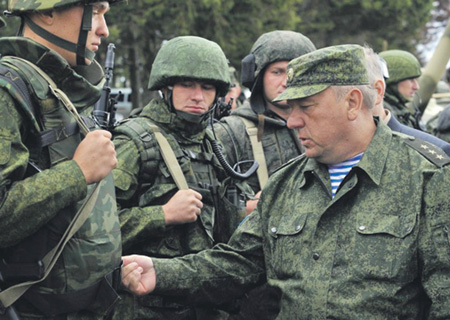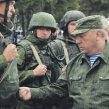
Kadyrov versus the Yamadaevs Becomes Kadyrov versus the Generals
Publication: North Caucasus Weekly Volume: 9 Issue: 23
By:

The conflict between Chechen President Ramzan Kadyrov and the Yamadaev brothers, who control the Vostok battalion of the Russian Defense Ministry’s Main Intelligence Directorate (GRU), shows few signs of winding down. Kadyrov failed to achieve his goal of disbanding the battalion quickly and kicking the Yamadaevs out of Chechnya and the conflict has become a standoff, turning from a conflict between two Chechen pro-Russian clans into a dispute between the Chechen authorities and the Russian military. On June 10, General Vladimir Shamanov, who heads the Russian Armed Forces’ Main Directorate for Combat Training and Service, declared that the special battalions of the Russian army, Vostok and Zapad, composed of contract soldiers of Chechen origin, will be left intact. “These battalions will certainly remain, because they not only fulfill important missions as part of the Combined Group of Forces in the North Caucasus, but they also carry out peacekeeping missions in Abkhazia and South Ossetia,” he said (Itar-Tass, June 10).
Throughout May, Kadyrov tried every way possible to finish off the Yamadaevs and the Vostok battalion. Mass graves were discovered in Chechnya one after another, and each time the Vostok fighters were immediately accused of being responsible for these murders (Chechnya Weekly, May 8 and 16). On May 12, Ramzan Kadyrov announced the suspension of Vostok battalion commander Sulim Yamadaev and called on Chechen and military prosecutors to investigate whether Vostok troops, including Yamadaev, were linked to murders and kidnappings in Chechnya and Dagestan (Chechnya Weekly, May 16). On May 15, the Chechen parliament, in a special declaration, came out in support of Sulim Yamadaev’s suspension (Regnum, May 15). On May 16, four Chechen deputies to the Russian parliament said in a statement that “the uncompromising policy of the president of the Chechen Republic, Ramzan Kadyrov, of putting on trial anybody who is guilty, regardless of their official position and previous merits, is being portrayed by the Yamadaev brothers as an attempt to get rid of unwanted and uncontrollable people” (Grozny-Inform, May 16).
On May 31, during a meeting with members of Chechnya’s government and the heads of the republic’s district administrations, Kadyrov announced that criminal proceedings had been started not only against ordinary Vostok members, but also against Vostok commander Sulim Yamadaev himself. Ramzan said that bodies were being exhumed in Vedeno District and other areas of Chechnya in connection with murders that the Yamadaev brothers were accused of (Chechnya Weekly, June 5).
In late May, Chechen utility companies cut off supplies of gas, electricity and water to the Vostok battalion’s base in Gudermes. Kadyrov even received indirect support from Memorial, Russia’s most influential human rights organization. Memorial demanded that the crimes supposedly committed by members of the Vostok battalion be fully investigated (Chechnya Weekly, May 22).
Yet each time Kadyrov initiated an attack against the Vostok and the Yamadaev brothers, the latter received support from the Russian Defense Ministry. Four days after Kadyrov said that Sulim Yamadaev had been suspended as commander of the Vostok battalion, a military official declared that the Vostok battalion had not been disbanded and that Yamadaev had not been removed as its commander (Grani.ru, May 19). When Kadyrov announced criminal proceedings against Sulim Yamadaev, the Military Prosecutor’s Office immediately denied this (Kommersant, June 1).
In the middle of May, at the peak of Kadyrov’s campaign against Vostok, General Alexander Baranov, who was then the commander of the North Caucasian Military District, declared: “The existence of the battalions that were formed on an ethnic basis (Vostok and Zapad – AS) is fully justified and the need for these units was dictated by life itself” (Regnum, May 24). At the same time, the commander of the Combined Group of Forces in the North Caucasus, Major General Nikolai Sivak, told the military newspaper Krasnaya Zvezda that the Chechen population supports the rebels in the region “while the insurgency continues to carry out attacks on federal forces such as the police, units of the Defense Ministry and Interior Ministry Internal Troops, including Chechens serving in the Interior Minister and in the Defense Ministry’s Vostok and Zapad battalions” (Krasnaya Zvezda, May 20). In his interview, Sivak targeted Kadyrov personally. In fact, in stating that the rebels mostly attack Russian forces or pro-Russian Chechen troops like the Zapad and Vostok battalions, the Russian commander was implying that Russia’s generals regard these battalions as a more reliable force than any of the Chechen troops loyal to Ramzan Kadyrov.
Kadyrov could not simply ignore this implication. Protests by Nurdi Nukazhiev, Chechnya’s human rights ombudsman, and Lema Gudaev, Kadyrov’s assistant, over the interview (Chechnya Weekly, May 29) showed just how enraged Kadyrov was by Sivak’s words.
On April 24, the commander of Russia’s ground forces, Vladimir Moltenskoi, met with Kadyrov in Chechnya and let it be understood that the Russian military command would not give up the Yamadaev brothers and their Vostok battalion easily (Regnum, May 24). Vladimir Shamanov’s recent statement only confirms this. The Russian generals have demonstrated again that they, not Kadyrov or anybody else, are the true masters in Chechnya and that only they can decide whom to suspend from command and what units should be disbanded. Commenting on Shamanov’s words about the fate of the Vostok and Zapad battalions, the Russian journalist Vladimir Rechkalov wrote that “the stronger the federal group is in the Chechen Republic, the longer will be the life of Ramzan Kadyrov who, being young, has already forgotten with the help of whose bayonets he has become the most important Chechen” (Moskovsky Komsomolets, June 11).




